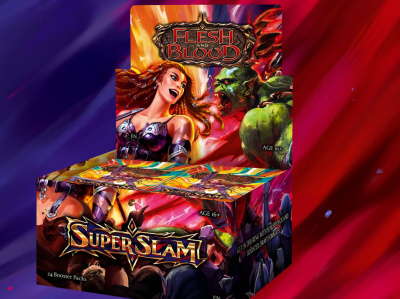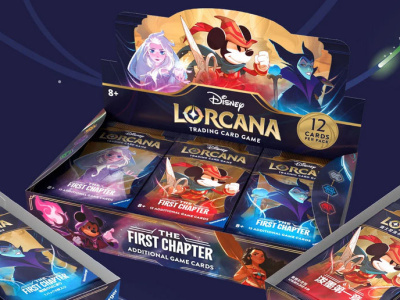About two months ago, we started researching how Wizards of the Coast handles release days for its various distribution channels. We were prompted by complaints we'd heard from game retailers about receiving or being permitted to sell new releases after retailers in other channels. We got more than we bargained for as we talked to distributors, retailers, and to WotC itself about this complex issue. Retailers varied considerably in how they reacted to release day issues, with one telling us, 'Other stores don't affect us; I don't even know if we're late,' and others expressing a high level of concern about getting beaten by other channels.
For its part, Wizards of the Coast acknowledges that its shipping policies have been an ongoing source of concern by its customers. Pat Booze, WotC Supervisor of Merchant Services told us, 'I've been at Wizards of the Coast for seven years and the first week I worked here..., we were getting calls about those issues. Time and release issues have always been there. We just try to be as fair and equal as possible.'
And based both on what WotC's customers and WotC itself told us, those policies have been in flux this year, as the company tries to come up with a comprehensive policy. One distributor told us that there have been 'five different policies' for RPG releases in 2001, and that WotC had said 'here are the new rules' in February, but then had changed them several times since then.
Booze concurred that there had been considerable flux. 'Over the last year, we've been experimenting with different shipping methods and windows,' said Booze. She said WotC was '...currently working on a cohesive release policy that will apply to all accounts and all product. The experimentation is coming to a head.' WotC hopes to have its new, more comprehensive policy in place during Q1 2002.
For background on WotC's distribution channels -- the various ways it gets its products to market -- see 'WotC Distribution Channels Explained.' That article provides information on the five main ways WotC goes to market, and how each one works.
WotC uses different release paradigms for its two main product groupings -- CCGs and RPGs (Chainmail is grouped with the RPGs). This is due not only to the differences in how the two products are distributed, but also to the fact that WotC developed its CCG business internally and acquired the bulk of its RPG business in its acquisition of TSR some years ago.
WotC has a formal release date for its CCG products, but uses a more general target 'window' for its RPGs. Presumably the disparity in size between the two product types (its CCG releases are much larger than its RPGs) may also be a reason why it tries to be more precise with the release date for CCGs (RPGs may just not be worth the hassle). It's also worth noting that the primary non-core distribution channel for RPGs -- the bookstores -- are not used to dealing with formal street dates except on the biggest of big releases, which are only a small fraction of the total number of new book releases every year. And as Booze told us, 'We have to play by the rules of the different channels. Wizards isn't arrogant enough to tell these channels, 'You're going to do it our way.''
CCGs
CCGs typically have a Monday street date. The stores WotC ships directly are shipped so that the products hit the stores at 'the appropriate time' for that street date. The WotC Dallas-area distribution center uses zone shipping for the direct accounts, shipping the more distant stores first. Direct accounts are told to honor the street date regardless of when they receive the goods, except for the Premiere stores' preview weekends (see below). Hobby distributors are shipped so the shipments from distributor to retailer can reach the store by the Monday street date.
Mass market accounts are more complicated because the chains use distribution hubs, and each chain has a different requirement for when product has to hit those hubs to meet the street dates. In fact, according to Booze, chain requirements for the arrival of CCGs at chain distribution hubs range from three weeks to four days prior to the street date. This creates 'a logistical dance' that has to be done for the mass accounts. Booze did say that WotC's chain accounts are all aware that the CCG products have street dates and their individual stores are asked to honor the street dates.
There are two approved ways in which CCGs reach consumers prior to the street date -- 'sneak preview weekends,' and pre-release tournaments. Premiere stores are allowed to do sneak preview weekends for new CCG releases. These events begin two days prior to the street release on a Saturday. Premiere retailers are to set up their stores to preview the product, product is sold at those events, and WotC does not limit the amount of product that can be sold to consumers. This means that about 1500 stores are allowed to sell new CCGs before the street date.
WotC also organizes pre-release tournament events, which are held a full week in advance of the street date. These are regional events set up by tournament organizers under contract to Wizards. Attending consumers can buy a limited amount of products from the tournament organizers (e.g., a starter and two boosters) for purposes of play at the event. These pre-release tournaments can be one-two weeks before the release date, but are usually one week in advance of release. The goal is to get consumers excited and talking about the product on discussion boards and in person. Pre-release tournaments may be run in a store, but are usually in a larger area that can hold 100-200 consumers. Tournament organizers are usually not retailers.
There are a couple of sources of confusion about these sanctioned ways in which CCG products are sold before the release date. First, pre-release and preview events are not 'capital letter terms' inside Wizards, according to Booze, which means that usage is not consistent throughout the company. Second, the events allowed vary by product. For example WotC organizes pre-release events for most Magic product, and some Pokemon and Harry Potter products, but not all. And not all CCG products, or even all Magic products have pre-release events. For example, Premiere retailers were allowed to sell Magic the Gathering: Odyssey beginning the Saturday before the street date, but no events were held.
Reports of retailers breaking street dates on CCGs are rare, according to Booze, and are divided roughly evenly between core retailers and chain stores. She also said that the situation has been improving in recent months, especially as it relates to chain stores, and that last year when WotC really started 'ramping up mass account relationships,' broken street dates were happening more often and involved more stores. She said that when chain accounts break release dates, WotC generally finds, 'It's not done maliciously, it's just a matter of communication between the headquarters and the store.' We asked what WotC's response was when a retailer (core or chain) breaks a release date, and received a 'no comment,' one of the few times that answer was given.
RPGs
The over-all release strategy on RPGs is that there's a target time when WotC wants to see its products on the shelf, but no street date per se. According to Booze, 'The rule of thumb for the last year has been that once you get it you sell it.'
Core retailers that buy RPGs directly from WotC are all shipped at the same time (whether Premiere or not). Holtzbrinck Publishers, which distributes WotC RPGs to the book trade, gets product earlier so they can get it into distribution to reach the market in the release window. Booze said that she assumes that Holtzbrinck has the same issues with chain headquarters that Wotc does (on its CCG products, see above). Hobby distributors are given distribution windows that they have to hit and are asked to try to get the products to their accounts within that window.
Why there's confusion --
There are a number of reasons why it's been difficult for retailers and distributors to get a handle on WotC's policies, some noted above. The first is just that given the many different channels WotC uses, their different business practices, and the different logistics methods for each, the situation is extremely complex. Then there's the terminology problem, which is inconsistent even within WotC. There's the fact that there's been considerable change in policy over the last year, so even when the policies are communicated clearly they're in flux and thus more difficult to understand. And Booze also acknowledged that the policies are complex enough that sometimes the WotC people get confused about who they're talking to or between CCGs and RPGs and give the wrong information to customers.
Is there an answer?
Release times for different channels raise some significant underlying issues . One is the question of whether returnable and non-returnable channels of distribution should have the same street date or release window. As one distributor pointed out, the customer that frequents a 'core' retailer may be hard-core enough to go to a Barnes and Noble if it gets the latest release early; the Barnes and Noble customer is unlikely to seek out a game store to get a new product a day or two earlier. Furthermore, if a returnable outlet gets beat it can simply return unsold product; if a non-returnable outlet gets beat and loses sales, it may have to 'dump' the product, reducing the product's market value while hurting the retailer's margins. This is an issue that's also come up in the comic business, with at least one major publisher (DC) shipping its returnable channel after it ships the core, non-returnable channel and another (Marvel) shipping both at the same time (see 'Why Marvel's Newsstand Customers Beat Directs and DC's Don't'). We asked WotC about this philosophical issue and received a 'no comment.'
Another significant underlying issue is which distribution channels WotC sees as more beneficial to its long-term success, and whether it will (or should) use release time as a tool to help strengthen those channels at the expense of others. WotC has been pursuing a vertical integration strategy over the last several years, both expanding its direct-to-consumer and its direct-to-retailer businesses at the expense of other channels. The preview weekends are certainly a way to strengthen its Premiere and company-owned stores at the expense of other channels. On the other end of the stick, there's the perception that 'hobby distributors never win,' as one distributor told us. Another hobby distributor said, 'WotC is owned by Hasbro, and Hasbro's all about big business. They'll do what's best for them on each product. Nobody can put a value on customer service or loyalties.'







